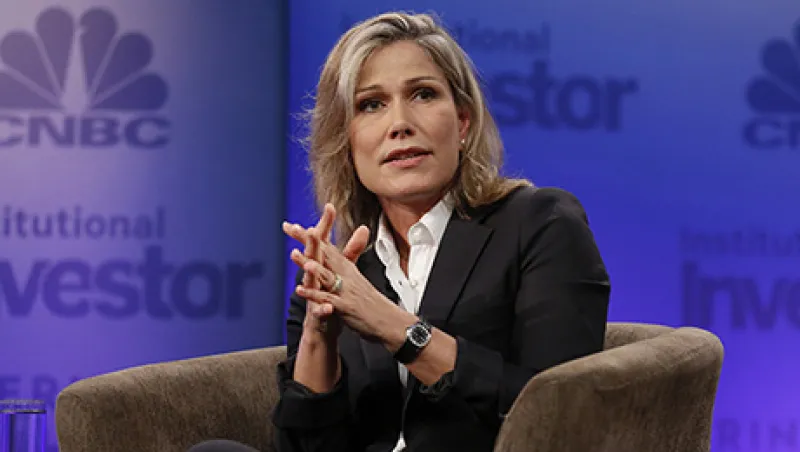For human investment managers, the news from leading algorithmic trader Leda Braga is both good and bad. Good, because she thinks there’s still a place for discretionary, human trading in certain corners of the market. Bad, because in her view, that place is shrinking. “The business of investment management is the business of data management,” said Braga during her appearance at Delivering Alpha today. “The algorithmic approach is the best way to do that.”
Braga, 48, has been described as the most powerful woman in the global hedge fund industry. After nearly 14 years at prominent European firm BlueCrest Capital Management, most recently as the head of its systematic trading fund, the Geneva-based Braga earlier this year launched her own firm, Systematica Investments. Systematica now has $8.8 billion in assets under management. At BlueCrest, Braga’s fund, which returned 12.7 percent in 2014, sat next to a fund run by discretionary traders; Systematica focuses exclusively on algorithmic trading. There’s a considerable cultural difference in the way systematic and discretionary traders approach the investment process: Discretionary desks are little more than “a collection of traders doing their own thing,” according to Braga, whereas the systematic style involves much more teamwork: “There’s a real process-driven culture to us,” she said.
Braga’s session at Delivering Alpha followed an earlier panel involving fabled activist investors Nelson Peltz and Bill Ackman. The work of activists — and short-sellers — involves, typically, deep research into the fundamentals and management teams of companies. Building positions in target investments can take years, with boardroom battles, differences of opinion over strategy and direction and personality clashes often necessitating protracted internal diplomacy efforts and other tricky exercises in moral suasion. Braga agrees this is not work that can be easily handed off to algorithms: “Machines can’t replicate what the activists are doing,” she said.
Systematic trading, especially high-frequency trading, is often portrayed in the mainstream media as nefarious and opaque. Braga says she is on a mission to turn the “black box” — Wall Street shorthand for the algorithms that systematic trading runs on — into a “white box:” There may be confidentiality and IP embedded in the content of the algorithms, but given that everything about the way systematic trades are conceived, executed and managed is recorded electronically, “if anything we’re more auditable than the discretionary guys,” she said. Moving away from those discrete segments of the investment universe where human processes will always dominate — activist investing, for example — the long-run trends are all in favor of the rise of the machines, Braga argued: “In a world where there’s regulator pressure for more auditability and investor pressure for lower fees, the systematic approach will prevail in the long run.”
But there are constraints: liquidity, the need for reliable data and simple human preference. “The stumbling block is the algorithm aversion,” said Braga. “We all prefer the human to do the job for us, even where the human does a worse job.” The increasing datafication of everyday life might make systematic trading the winning long-run bet in the struggle over investment styles. But in Braga’s eyes, for that bet to come good, “we have to get more rational.”
Get real-time updates throughout the day on our Delivering Alpha Live Blog.






